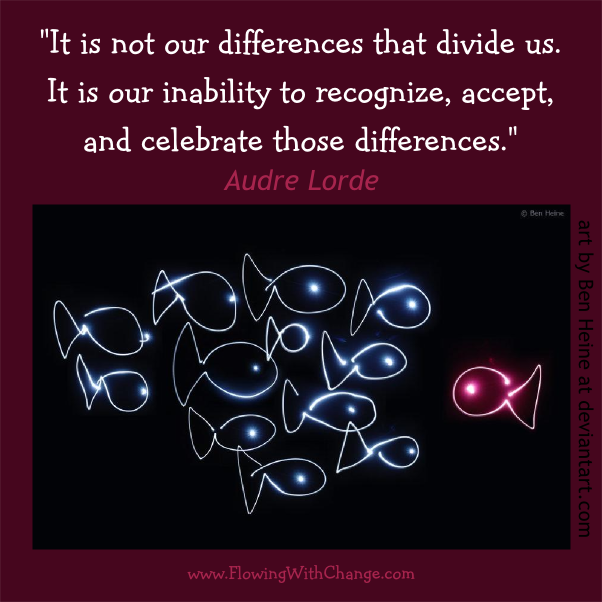A very popular argument atheists and non-religious people often bring up when discussing religion is that religion seeks to divide & rule. It divides people, sometimes causing a lot of bloodshed, and therefore religion is evil and must be abolished. True, religion has indeed caused a lot of bloodshed, but so has nationalism. Hence, blaming all of mankind’s woes on religion is quite biased, I would think. It’s not religion, exclusively, that divides people; rather people fight over all sorts of things, race being an example. Should we, or rather, can we get rid of the diversity of our colors just so that we could avoid conflict?
I believe things are neutral. Religion, too, is neutral. It’s your attitude towards it that determines whether you choose to unite, or separate yourself from others. After all, people interpret holy texts the way they are. The Quran is held dear by both Mavlana Rumi, and barbaric Islamists! So, education, as with everything else, is required to curb oppressive ideologies like racism and sectarianism, which is what the Quran aspires to do.
The Quran stressing on Unity:
You must hold fast, all of you together, to the Bond of God and be not divided into sects. Quran, 3:103
And do not be like the ones who became divided and differed after the clear proofs had come to them. And those will have a great punishment.Quran, 3:105
Those who break the unity of their Deen and become sects, you have nothing to do with them whatsoever. Their case will go to God and He will then tell them what they had been doing. Quran, 6:159
(And do not be) of those who have divided their Deen and become sects, every faction rejoicing in what it has. Quran, 30:32
Steadfastly uphold the Deen (Way of Life), and do not break up your unity therein. Quran, 42:13
What went wrong?
Despite these very clear and straight-forward commandments, the “Muslim World” is quite the hub of violent sectarianism that causes much bloodshed within those regions. We have this nasty habit of cherry-picking the verses we choose to follow. So, the verses that call for unity often get ignored and are replaced with self-serving opinions of mullahs that promote sectarianism. Furthermore, fundamentalism and bigotry play a part as well.
Let me take you through the mindset of a sectarian, as I myself have been through that phase. It is the unshaken belief that my sect is the only ‘right’ version of Islam and worthy of salvation, while all others are misguided and headed for doom. Instead of compassion, there is a strong sense of fear and hate for them. Assuming infallibility for one’s self, religion becomes a tool to satisfy the ego by calling others infidels and other derogatory labels. All in all, it is either my way, or the highway.
If we were to measure spiritual maturity in terms of our biological growth, then fundamentalism could be called the childhood. A natural phase, but something you’re supposed to grow out of! (You may read my full piece on stages of consciousness here.)
What a beautiful saying, isn’t it? Unfortunately, a sectarian might even have a problem with why I shared a “Hindu” proverb! You see? So, forget that. Let me show you verses in the Quran that completely shatter sectarianism. Contrary to popular opinion, there is not only ONE “correct” path to practice Islam, rather there are MULTIPLE paths:
Through this Book, God guides to PATHS of Islam, those who seek His Approval. He brings them out of darkness into the light of His grace, and guides them to the straight path. Quran, 5:16
As for those who sincerely strive for Us, We surely guide them onto PATHS that lead to Us. God is with those who do Good. Quran, 29:69
How can we Unite?
Let me start by clearing a misconception. Unity does not equate to uniformity. Some people have the view that unity can only be achieved among people who have the same (or identical) set of beliefs, cultural practices, and paradigms. This is not only highly improbable, but is also flawed conceptually. See, human beings are complex creatures, with their own set of unique experiences that shape their paradigms. Forget billions of Muslims, you would not find two people who are exactly the same.
To me, unity can be achieved regardless of the beliefs of others. It is the internalization that God has created people with a free will of their own, and that they may choose whichever spiritual path which makes them the closest to God, turning them into a better human being. Mind you, I am not shunning or discouraging rational discussion. Undoubtedly, discussion is crucial for growth and reform. However, what you stop doing is that you stop playing God, as you realize that judgment belongs to God alone (13:40). All it takes is spiritual maturity and broad-mindedness from your side.
Dropping the labels does not solve the problem
One of the solutions put forward to achieve unity is to identify yourself as only a Muslim instead of a Sunni Muslim, a Shia Muslim, a Quranist Muslim, or a Sufi Muslim. For a long time, I agreed with this notion. However, now I think that it’s superficial at best. Labels don’t create sects; sectarian behavior does. The problem with identifying yourself as only a Muslim is that sectarian behavior may still exist within your psyche. You may consider yourself a “true Muslim” and others “not so true Muslims”. I have experienced this first-hand, so I’m convinced that this is not the answer.
Let’s face the reality here. You simply can’t expect every Muslim to share the same interpretation of the Quran. Therefore, labels help us identify one another. And, identification is a crucial factor in dialogue. Let’s take an example. If you were to ask me about my country of origin, and I responded by saying that I am a “citizen of the world”, would you expect the conversation to evolve from there? Probably not. There is a lack of information, so it might stop there and then. However, if I say I’m an American, you may share your personal stories that are relevant, and the dialogue furthers.
So, the problem doesn’t lie in the labels, it lies in sectarian behavior which is a psychological construct and can be eradicated through education. The sectarian ideology is the real culprit here, which needs to be addressed. The ideology that since X and Y are different from me, they must be my enemies. Different approaches to Islam are not a threat to unity, bigotry is!
The key word in those verses, as we saw above, is to “not divide into sects”. You can be a Sunni Muslim who does not discriminate against Shias, for example. In this case, you find that Sunni Islam makes the most sense to you, but for others, it might be Shia Islam or Quranist Islam. Realizing that freedom of belief is a gift of God, you not only unite with other Muslims, but also free yourself from the negative energy of hate.
In a nutshell, sectarianism causes division. Division causes hate. Hate causes extremism. Extremism causes bloodshed. Hence, this becomes the perfect recipe for an unstable society and precisely why sectarianism has been severely discouraged in the Quran.
Final Thoughts
Dear fellow Muslims, we must stop fighting over petty issues and instead unite to fight the power-mongering psychopaths that seek to cause disharmony between us. Disunity can never bring about any good! Let us put all the barriers of race, gender, sex orientation, religion, and politics to rest and respect people for what they are, provided they are not harming another human being. I call for unity! I call for Islam!
The question is, will you respond?
Liked What You Read? Please share this article on your Facebook & Twitter accounts to promote our voice!
Want to be kept updated on our latest articles? Subscribe to our blog, and join us on our Facebook page!
















